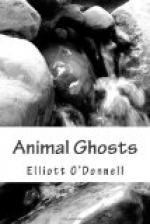Though dogs are, perhaps, rather more alarmed at the Unknown than cats, I do not think they have a keener sense of its proximity. Still, for the very reason that they show greater—more unmistakable—indications of fear, they make surer psychic barometers. The psychic faculty of scent in dogs would seem to be more limited than that in cats; for, whereas cats can not only detect the advent and presence of pleasant and unpleasant phantoms by their smells, few dogs can do more than detect the approach of death. Dogs make friends nearly, if not quite, as readily with cruel and brutal people as with kind ones, simply because they cannot, so easily as cats, distinguish by their scent the unpleasant types of spirits cruel and brutal people attract; in all probability, they are not even aware of the presence of such spirits.
It would seem, on the face of it, that since dogs are, on the whole, of a gentler disposition than cats, that is to say, not quite so cruel and savage, the phantasms of dogs would be less likely to be earth-bound than those of cats; but, then, one must take into consideration the other qualities of the two animals, and when these are put in the balance, one may find little to choose—morally—between the cat and the dog. Anyhow, after making allowance for the fact that many more cats die unnatural deaths than dogs, there would seem to be small numerical difference in their hauntings—cases of dog ghosts appearing to be just as common as cases of cat ghosts.
Apropos of phantom dogs, my friend Dr. G. West writes to me thus:—
“Of the older English Universities many stories are told of bizarre happenings,—of duels, raggings, suicides and such-like—in olden times; but of K., venerable, illustrious K. of Ireland, few and far between are the accounts of similar occurrences. This is one, however, and it deals with the phantom of a dog:—
“One evening, towards the end of the eighteenth century, John Kelly, a Dean of the College (extremely unpopular on account of his supposed harsh treatment of some of the undergraduates), was about to commence his supper, when he heard a low whine, and looking down, saw a large yellow dog cross the floor in front of him, and disappear immediately under the full-length portrait that hung over the antique chimney-piece. Something prompting him, he glanced at the picture. The eyes that looked into his blinked.
“‘It must be the result of an overtaxed brain,’ he said to himself. ‘Those rascally undergraduates have got on my nerves.’
“He shut his eyes; and re-opening them, stared hard at the portrait. It was not a delusion. The eyes that gazed back at him were alive—alive with the spirit of mockery; they smiled, laughed, jeered; and, as they did so, the knowledge of his surroundings was brought forcibly home to him. The room in which he was seated was situated at the end of a long, cheerless, stone passage in the western wing of the




